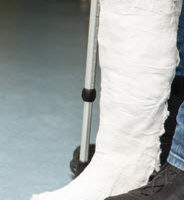Is a Building Owner Liable if a Construction Subcontractor Is Injured?

In Tennessee, property owners are generally liable if they fail to “exercise reasonable care” to prevent personal injury to individuals who are lawfully on the premises. This includes any people who are performing contracted work on the property. Indeed, Tennessee law expressly guarantees employees of independent contractors working on the premises the right to work in a “reasonably safe” space, taking into consideration all of the relevant circumstances.
TN Court Reinstates Lawsuit Over Extension Cord Accident
Of course, when it comes to things like construction projects, property owners often try and blame any injuries or accidents on the contractors themselves. Take this recent decision by the Tennessee Court of Appeals. In this case, the plaintiff was employed by a company hired to work as a sheet rock subcontractor on the defendant’s construction project. As part of his job, the plaintiff used a power tool while standing on scaffolding in the defendant’s building.
According to the plaintiff, the only available outlet to plug in his tool was located on the other side of the warehouse. This necessitated using a 100-foot extension cord. For several days the plaintiff used the extension cord without incident. However, on the day in question, one of the defendant’s employees “drove a forklift, in reverse,” through a doorway where the extension cord was located. This caused the forklift to pull on the cord, which in turn pulled on the scaffolding, causing the plaintiff to fall 10 feet to the ground.
The plaintiff filed a premises liability lawsuit against the defendant, alleging it “failed to properly maintain the premises under its care.” The defendant replied the plaintiff was liable for creating the hazardous condition–i.e., the 100-foot extension cord–that caused the accident in the first place. A trial court agreed with the defendant’s interpretation of events and dismissed the plaintiff’s lawsuit.
The Court of Appeals disagreed and reversed. As the appeals court noted, while the plaintiff may have “placed the extension cord on the floor in the doorway,” they did not exercise any “control” over the defendant’s employees. More precisely, the plaintiff did not control the use of the forklift or the forklift driver’s failure to keep a lookout for potential hazards in the area.
Furthermore, the Court of Appeals noted the defendant had actual notice of the hazard posed by the extension cord, which is a necessary element of any premises liability claim in Tennessee. The evidence before the trial court showed the defendant’s employees asked the plaintiff to move the extension cord multiple times in the days prior to the accident, specifically so their equipment could safely pass through the doorway. Given this, a jury could find the defendant failed to “act with reasonable care” when its forklift driver crossed the doorway without stopping to make sure the extension cord had been moved first.
Speak with a Tennessee Premises Liability Attorney Today
Premises liability claims like the case above are almost always dependent on the specific facts. This is why it is important to engage a qualified Clinton personal injury attorney who can assist you with fully investigating your accident before proceeding to court. If you have been injured on someone else’s property and need legal advice, contact Fox, Farley, Willis & Burnette, Attorneys at Law, today.
Source:
scholar.google.com/scholar_case?case=13321950211677712766
